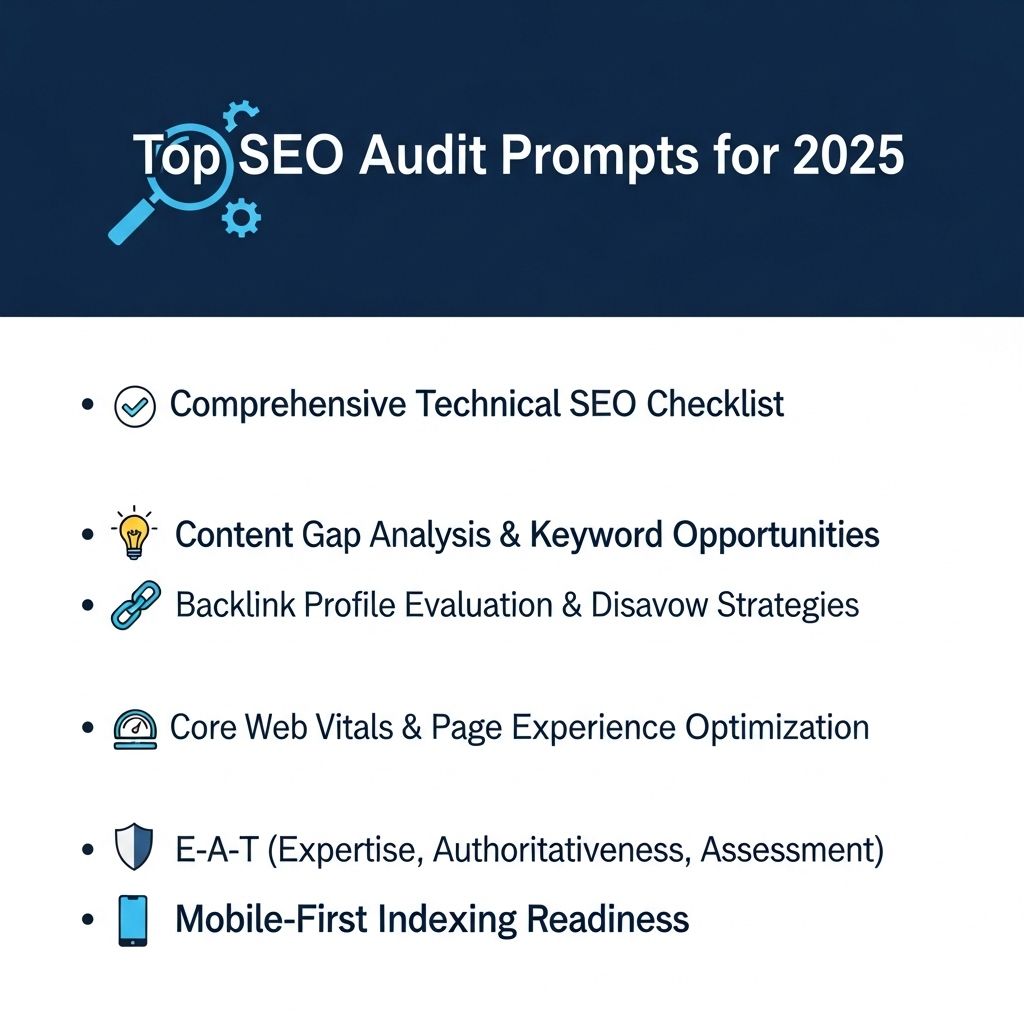As we move into 2025, the landscape of search engine optimization (SEO) continues to evolve at a breakneck pace. Staying ahead of the curve requires understanding the latest trends, tools, and techniques to ensure your website is fully optimized for search engines. One of the most effective ways to maintain an edge is by conducting regular SEO audits. This article outlines essential prompts and considerations for performing an SEO audit that is relevant for this year.
The Importance of SEO Audits
SEO audits are crucial for identifying areas of improvement on your website. Whether you’re a small business owner, a digital marketer, or a web developer, understanding the significance of these audits can help you maintain your site’s visibility and ranking. Here are some reasons why conducting regular SEO audits is essential:
- Identify Technical Issues: Spotting technical problems that could hinder search engine crawling and indexing.
- Enhance User Experience: Improving navigation, load speed, and overall user satisfaction.
- Stay Competitive: Understanding your competitors’ SEO strategies and adapting accordingly.
- Align with Algorithm Changes: Keeping up with search engine algorithm updates to ensure compliance.
Key Areas to Focus On
When conducting an SEO audit, it’s important to break down the process into manageable sections. Here are some key areas to focus on:
1. Technical SEO
This includes the foundation of your website. A thorough technical SEO audit will cover the following:
- Site Speed: Use tools like Google PageSpeed Insights to assess your site’s loading times.
- Mobile-Friendliness: Ensure your site is responsive and offers a great experience on mobile devices.
- URL Structure: Check for clear, concise URLs that include relevant keywords.
- XML Sitemap: Ensure your sitemap is up to date and submitted to search engines.
2. On-Page SEO
On-page elements significantly affect how well your content ranks. Key considerations include:
- Title Tags: Ensure they are compelling, relevant, and include target keywords.
- Meta Descriptions: Write unique meta descriptions that accurately summarize page content.
- Header Tags: Use
<h1>through<h6>effectively to organize content. - Content Quality: Review content for relevance, originality, and keyword optimization.
3. Off-Page SEO
Off-page SEO refers to actions taken outside your website that affect your rankings. Consider the following:
- Backlink Profile: Analyze the quality and relevance of backlinks pointing to your site.
- Social Signals: Monitor engagement on social media platforms related to your content.
- Brand Mentions: Track brand mentions across the web to improve online reputation.
Tools for SEO Audits
Utilizing the right tools can significantly enhance the efficiency of your SEO audits. Here is a list of popular tools to consider:
| Tool | Purpose |
|---|---|
| Google Search Console | Monitor website performance and index status. |
| Ahrefs | Backlink analysis and keyword research. |
| SEMrush | Comprehensive SEO and marketing analysis. |
| Moz Pro | Keyword tracking and on-page optimization tips. |
| Screaming Frog | Crawl website for technical SEO issues. |
Future Trends in SEO for 2025
As we look forward to 2025, certain trends are likely to shape the future of SEO. Staying informed about these trends will provide a competitive advantage:
- AI-Powered Content Creation: The use of AI tools for content generation will continue to rise, focusing on quality and relevance.
- Voice Search Optimization: With the increasing use of voice-activated devices, optimizing for conversational queries will be critical.
- Video SEO: Video content will dominate; optimizing videos for search engines will become essential.
- Local SEO Enhancements: Businesses with physical locations will need to target local SEO more aggressively.
Conclusion
Conducting regular SEO audits is essential for maintaining and improving your website’s visibility in search engine results. By focusing on the key areas outlined in this article and utilizing the right tools, you can ensure your website remains competitive in the ever-evolving digital landscape of 2025. Keep the future trends in mind as you audit your SEO strategies, and you will be well-equipped to adapt to the changes and maintain a strong online presence.
FAQ
What is an SEO audit and why is it important?
An SEO audit is a comprehensive analysis of a website’s search engine optimization performance. It helps identify areas for improvement, ensuring that the website is optimized for search engines and users alike, ultimately driving more organic traffic.
What are the key components of an SEO audit?
Key components of an SEO audit include technical SEO analysis, on-page optimization review, content assessment, backlink evaluation, and competitor analysis. Each component helps identify strengths and weaknesses in the site’s SEO strategy.
How often should I conduct an SEO audit?
It is recommended to conduct an SEO audit at least once a year, or more frequently if you make significant changes to your website, launch new content, or notice a drop in search rankings.
What tools are best for performing an SEO audit?
Some of the best tools for conducting an SEO audit include Google Search Console, SEMrush, Ahrefs, Moz, and Screaming Frog. These tools provide insights into various aspects of your site’s SEO performance.
Can I perform an SEO audit myself?
Yes, you can perform an SEO audit yourself using various online tools and resources. However, for a more comprehensive analysis, you may want to consider hiring an SEO professional or agency.
What are the benefits of fixing issues found in an SEO audit?
Fixing issues identified in an SEO audit can improve your website’s search engine rankings, enhance user experience, increase organic traffic, and ultimately lead to higher conversion rates.




